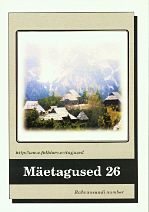Rahvus kui religioosne kategooria, natsionalism kui ontoloogia. Serbia juhtum
Nation as Religious Category, Nationalism as Ontology. The Serbian Case
Author(s): Saša NedeljkovićSubject(s): Anthropology
Published by: Eesti Kirjandusmuuseum
Summary/Abstract: In Serbian culture two very interesting scientific issues can be found - first, the strong ontological approach to nationalism, i.e. believing that nation is a religious category, and second, the analysis of application of Ernest Renans' conclusion that national sorrow and suffering are more important for national consciousness than success and victory. A very important factor was the parallel development of Christianity and literacy in Serbia: alphabet and literacy were introduced to the Serbs by Christian missionaries. The acceptance of Christianity gave rise to Serbian literature. Also, Christianization of the country played a major role in the establishment and development of the first Serbian state. The first truly Christian ideologist in Serbia was St. Sava, the founder of the independent Serbian Orthodox Church in the 13th century. He was, in a very subtle way, a promoter of Old Testament morality. According to a legend St. Sava said that Serbs were "destined" to be "the East on the West and the West on the East" and that they only worship "Holy Jerusalem, and nothing on the Earth". St. Sava also compared Nemanja, his father, with Avraam, and the Serbian people with Israel. In the period from 1389, following the Battle of Kosovo, after which the Serbs lost their empery and became Turkish vassals and were incorporated into the Ottoman Empire, until the 19th century, the popularisation of Christianity was exercised through folk epic poems. These poems were segments of a well-known Kosovo myth. The Kosovo myth constitutes a cultural complex established by the combination of the Old Testament (heroic and ethnic) and the New Testament (universal and personalised) logic. The direct motif for establishing this myth was the Battle of Kosovo. The forming of "the Kosovo pledge", which placed the message of Christianity into nationally historical context and suppressed the New Testament, follows this complex. The basis of Kosovo myth is a Christian intonation of the legend of the Serbs directed to the "heavenly empery" and abandoning direction to "earthly goodness"; this direction to "heavenly empery" became the direction for obtaining eternity through heroic deeds and it is adjusted to the cult of ancestors. My article deals with the correlation between ethnicity and religiosity, i.e. the influence of ethnicity on religiosity. Ethnicity, as we have seen, is a very strong force, which can assimilate and transmute any ideology. The assimilation of the Christian ideology is a good example. Throughout Serbian history there has been a strong strive after transmutation of the genuine Christian idea. From the very early development of Christian religion in the Serbian culture, there has been a certain kind of misuse of the religious message; universal religion has always been understood as a part of national culture.
Journal: Mäetagused. Hüperajakiri
- Issue Year: 2004
- Issue No: 26
- Page Range: 9-22
- Page Count: 24
- Language: Estonian

